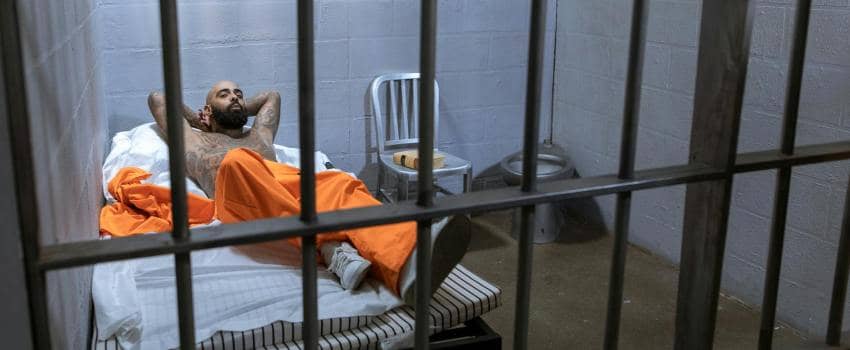Three Strikes Law in Georgia

What is the Three Strikes Law in GA?
Updated July 9, 2024
Under Georgia Code § 17-10-7, Georgia’s three strikes law requires mandatory long prison sentences (25 years up to life in prison) when convicted of Georgia’s Seven Deadly Sins felony crimes on three or more separate occasions. The purpose of the three strikes law is to protect the public from the most dangerous people.
The Seven Deadly Sins
Passed in 1995, Georgia’s “Seven Deadly Sins” law, for those seven crimes, is the toughest in the nation. Per the website; “It mandates, for a first offense, a nonparolable sentence of at least ten years for kidnapping, armed robbery, rape, aggravated sodomy, aggravated sexual battery, and aggravated child molestation. Minimum sentence for first offense of murder is life, with no parole eligibility for 25 years. Second offense of any of the “seven deadly sins” gets life without possibility of parole.” 1
It’s worth noting that felonies committed in other states may be considered by the legal system when considering prosecuting someone under the three-strikes law.
Georgia’s Three Strikes Law is a provision about half of the States have adopted to keep habitual offenders of felony crimes off the street. The result of being convicted under the 3 strikes law is 25 years to life without the ability for parole.
In Georgia these offenses count towards the 3-strikes limit:
- Murder
- Kidnapping
- Rape
- Aggravated sexual battery
- Aggravated child molestation
- Aggravated sodomy
- Armed robbery
Per the Findlaw website, “The statute also specifically excludes certain felonies, such as unarmed robbery offenses or arsons which posed no threat to human life. However, in those cases, the burden is on the defendant to show that the crimes didn’t involve threats to use a dangerous weapon and that no threat of death or bodily injury was involved. In other words, these can count as strikes unless a defendant proves otherwise.”2
Most cases in Georgia never get to the third strike before a person receives a life sentence. So if you have two strikes currently, and are facing a third felony offense, it requires a good lawyer to defend you in order to not be charged under the three strikes law. There is also an issue with non-violent third strikes that can make your case complicated. Some non-violent third strikes have been treated graciously by the court while others receive the full penalty which is life in prison without parole.
Three-Strikes Law vs. Recidivist Statute
People who have past convictions, and are facing new felony charges, may be prosecuted and sentenced under the Three-Strikes Law or the Recidivist Statute. The three-strikes law comes into play with multiple convictions of the Seven Deadly Sins crimes. Other people convicted of felonies, who have a lengthy criminal conviction record, may suffer harsher sentencing under the provisions of the Recidivist Statute.
O.C.G.A. 17-10-7: Punishment of Repeat Offenders
a. Except as otherwise provided in subsection (b) or (b.1) of this Code section, any person who, after having been convicted of a felony offense in this state or having been convicted under the laws of any other state or of the United States of a crime which if committed within this state would be a felony and sentenced to confinement in a penal institution, commits a felony punishable by confinement in a penal institution shall be sentenced to undergo the longest period of time prescribed for the punishment of the subsequent offense of which he or she stands convicted, provided that, unless otherwise provided by law, the trial judge may, in his or her discretion, probate or suspend the maximum sentence prescribed for the offense.
b.
- 1. As used in this subsection, the term “serious violent felony” means a serious violent felony as defined in subsection (a) of Code Section 17-10-6.1.
- 2. Except as provided in subsection (e) of Code Section 17-10-6.1, any person who has been convicted of a serious violent felony in this state or who has been convicted under the laws of any other state or of the United States of a crime which if committed in this state would be a serious violent felony and who after such first conviction subsequently commits and is convicted of a serious violent felony for which such person is not sentenced to death shall be sentenced to imprisonment for life without parole. Any such sentence of life without parole shall not be suspended, stayed, probated, deferred, or withheld, and any such person sentenced pursuant to this paragraph shall not be eligible for any form of pardon, parole, or early release administered by the State Board of Pardons and Paroles or for any earned time, early release, work release, leave, or any other sentence-reducing measures under programs administered by the Department of Corrections, the effect of which would be to reduce the sentence of life imprisonment without possibility of parole, except as may be authorized by any existing or future provisions of the Constitution.
(b.1) Subsections (a) and (c) of this Code section shall not apply to a second or any subsequent conviction for any violation of subsection (a), paragraph (1) of subsection (i), or subsection (j) of Code Section 16-13-30.
c. Except as otherwise provided in subsection (b) or (b.1) of this Code section and subsection (b) of Code Section 42-9-45, any person who, after having been convicted under the laws of this state for three felonies or having been convicted under the laws of any other state or of the United States of three crimes which if committed within this state would be felonies, commits a felony within this state shall, upon conviction for such fourth offense or for subsequent offenses, serve the maximum time provided in the sentence of the judge based upon such conviction and shall not be eligible for parole until the maximum sentence has been served.
d. For the purpose of this Code section, conviction of two or more crimes charged on separate counts of one indictment or accusation, or in two or more indictments or accusations consolidated for trial, shall be deemed to be only one conviction.
e. This Code section is supplemental to other provisions relating to recidivous offenders.
If you are facing the consequences of Georgia’s Three Strikes Law we strongly encourage you to call our expert defense lawyers at 770-956-1400.
CREDITS and FOOTNOTES
- 1 Staff Writer, “No Mandatory Minimum Sentences”, January 21, 2019, Available from Reform Georgia
- 2 Findlaw Staff, “Three-Strikes Sentencing Laws”, September 13, 2023, Available from Findlaw
- Photo by RDNA Stock, available at Pexels


